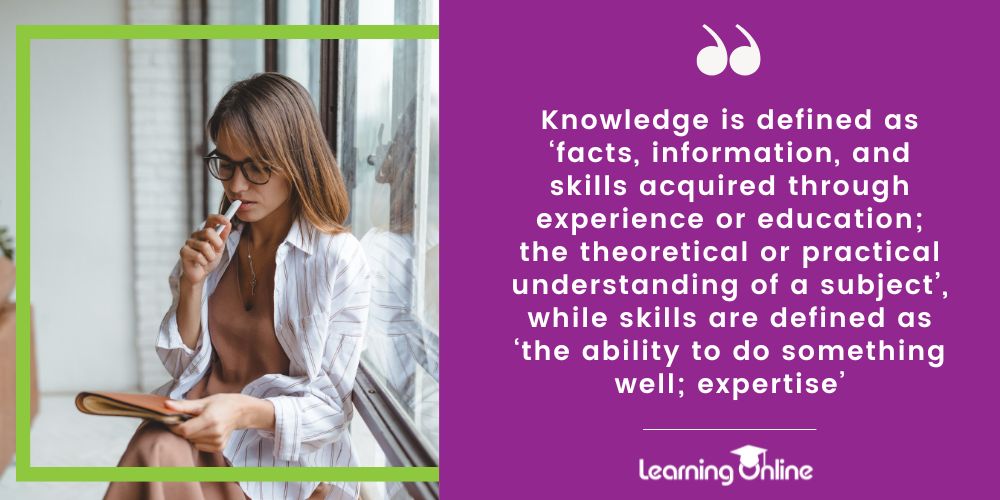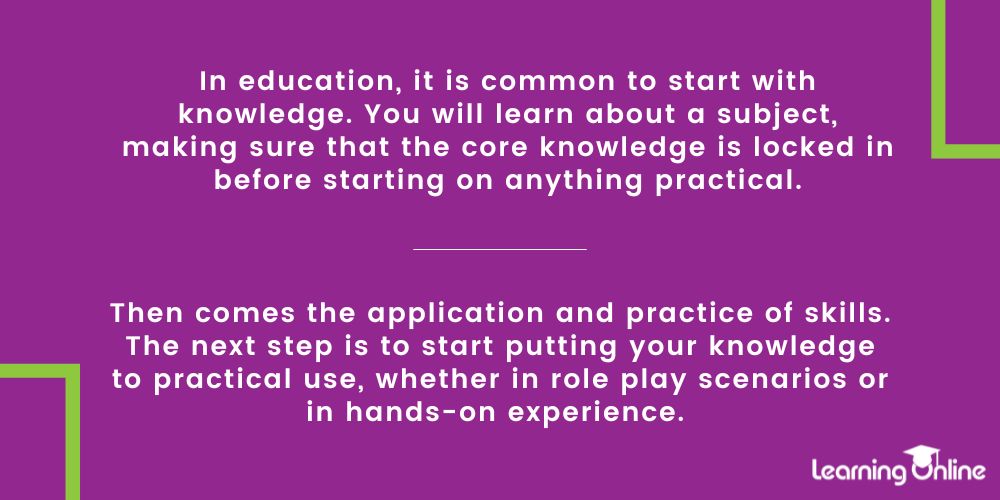It is often thought that knowledge and skills are actually two different concepts. Knowledge is usually understood as the retaining of relevant information, whilst skills tend to be considered more practical applications of this knowledge.
But what does this mean, and what’s most important when trying to start a new career – knowledge or skills?
In this blog, we will attempt to unpack some of the differences between knowledge, skills and abilities, looking at what they are, sharing some skills and knowledge examples, how they are different, as well as why they might not be so different after all…
The importance of skills and knowledge
Knowledge is defined by Oxford Languages as ‘facts, information, and skills acquired through experience or education; the theoretical or practical understanding of a subject’, while skills are defined as ‘the ability to do something well; expertise’.
From this understanding, it could be recognised that trying to compare the concepts of knowledge and skill will just leave you chasing your tail. It seems that one comes hand in hand with the other.
However, it’s also possible to have theoretical knowledge of something without engaging in the practical skill needed to perform it.
We get that this can all seem a bit confusing, so let’s look at some examples.

What are examples of skills and knowledge?
We’ve come up with a few imaginary scenarios to show how you could contrast the concepts of knowledge and skill in a few clear examples:
Scenario 1
Imagine you are training to be a farm vet. You have studied the anatomy and ailments of farm animals, watched videos on certain procedures and been equipped with all the possibilities and avenues that could arise when dealing with the health of these creatures.
You get called to help a female cow birth her calf. Things will not always run smoothly and be textbook perfect, and you must have the knowledge of what to do should things go awry.
However, the practical skill is what is going to get the baby out: knowing where to put your hands, how to help and support the mother, knowing the warning signs of distress and how to maneuver the calf free and ensure it is alive and well once birthed – the skill is the practical application of the knowledge.
Scenario 2
Imagine you have a job interview for a position as a medical receptionist. At the interview, the employer asks what relevant skills you have that would make you suited to the job. These may include an adeptness with technology, good communication skills, good organisation and time management.
For a job such as this, practical skill application is integral. Equally, it is evident that the knowledge and skills required for the job are fairly intertwined with one another. You can’t really have one without the other.
Scenario 3
Imagine you want to set up your own beauty business, specifically in nail tech treatments. Of course, having a depth of knowledge about nail health and the appropriate safety and procedure that comes with certain treatments is vital.
From this knowledge comes the vital practical skill of being able to carry out beautiful nail treatments to a professional standard to ensure customer satisfaction.
What are examples of skills and knowledge?
Knowledge vs skills in education can be more black and white and follow more of a structure when it comes to acquiring each.
In education, it is common to start with knowledge. You will learn about a subject, about theoretical scenarios and how to deal with them, making sure that the core knowledge is locked in before starting on anything practical.
Then comes the application and practice of skills. The next step is to start putting your knowledge to practical use, whether in role-play scenarios or in hands-on experience – one of the best ways to learn is to do.
Your knowledge of a subject gives you a solid foundation on which to stand while you navigate the practicalities of your career and grow your practical skills.

In conclusion
The answer to “what’s most important when trying to start a new career – knowledge or skills?” is…both.
It’s quite hard to have one without the other, and so ensuring that you have a healthy mix of both relevant knowledge and practical skills is super important and will give you the best chance at success in a new career.
Knowledge is often used as an umbrella term, referring to someone who possesses foundational, theoretical and practical know-how to excel in their job.
By the time you finish your education and pursue your chosen career, you should have most of the relevant practical skills needed to carry out the job’s demands. If education is the dress rehearsal, then a new career opportunity is opening night. Each show will be different, and you will learn more as you go, but a solid skill set is what will get you the job in the first place.
Looking for a new career?
One of the best ways to expand both your knowledge and skills in your chosen profession is to take a course of study. Whether you are starting anew or want an educational refresher, a short course can help you upskill and get in the best place to start a new career.
Look no further than My Learning Online!
We offer a vast range of comprehensive courses in various business sectors. Whether you are starting out or returning to training, a certificate is an impressive asset which will allow you to put new knowledge and skills in your resume for an added touch of employability. Our Swiss neighbours over at Resume Genius outline some of the best ways to lay out your skills when writing your resume.
Not only will you learn new skills on one of our online courses, but you will also have opportunities to network with like-minded people, opening doors to different job opportunities and business ventures that you perhaps hadn’t been exposed to before.
Check out our courses in:
- Photography
- Wildlife and Animal
- Beauty
- Agriculture and Farming
- Lifestyle
- Landscaping and Horticulture
All our certificates follow an entirely online course structure, giving you the flexibility to work your learning around your schedule and lifestyle. This 24/7 access to learning and total flexibility sets us apart from other study programs and is the perfect choice for anyone who may not have the time or resources to commit to a full-time degree course.
Each of our courses comes with a downloadable brochure with more information on course content, accessing your learning online, tutor support and more. We also have course fee payment plans available to make the financial side of things that little bit easier.
We have a friendly team of course consultants on hand to answer any questions or queries you may have and to help direct you towards the best course for you. Speak to one of our consultants today to learn more about any of the courses that spark your interest.
Boost your knowledge AND skills with a short course from My Learning Online.





